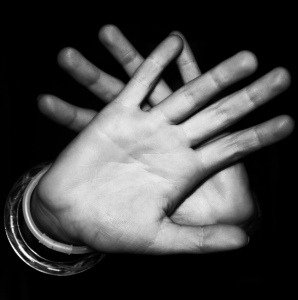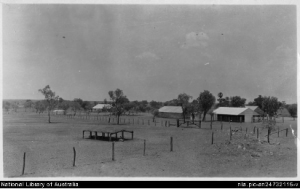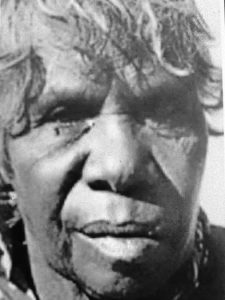We can’t demand forgiveness from others (from white fellas or others). This story was related to Rodney by his mother …
Back in the late 1930s, when my mother was a young girl, it was the job of the police to round up mixed-race kids off cattle properties and wherever they were and send them to different institutions. In the Kimberley, they were sent to Beagle Bay, to Forrest River Mission and Moolaboola settlement.
They knew there were mixed-race kids living at Lansdowne Station in the Kimberley, so the police went up there on horseback. My grandfather had a little property there. He was white, from England, and was living with my grandmother. In those days, black and white weren’t allowed to marry as it was against Australian government policy, but they co-habited and produced my mum.
When Mum was about seven or eight, the authorities went to Lansdowne and my grandfather had a fight with the two policemen. My granddad was a big fellow and he flogged the two police. Then he rode up the paddock, just to cool off, and while he was away the police took my grandmother and her sister and marched them to Fitzroy.
My grandmother and her sister had a cuff around their necks and a chain tied to the saddle of the police. At night they gave them some food, allowed them to go to the toilet, then put chains around their ankles so they wouldn’t escape. My mother was running alongside following them. But when my mum got tired, the police put heron the saddle and carried her on the horse to Fitzroy. It took about three days from Lansdowne to Fitzroy. They were treated very badly.
When my mum and grandmother finally got to Fitzroy, my grandmother was sent to work in the little old post office. When the police came back through to Fitzroy to pick up the mixed-race kids in the paddy wagon, she ran away down the creek. The police chased her on horseback and grabbed her by the hair. She was screaming as they put her in the paddy wagon, and they se nt her to Moolaboola station. Another mixed-race girl was in that paddy wagon. My Mother was at Moolaboola for over twenty years, and that’s where we were born and grew up.
nt her to Moolaboola station. Another mixed-race girl was in that paddy wagon. My Mother was at Moolaboola for over twenty years, and that’s where we were born and grew up.
When Moolaboola closed in 1955, I was about eight years old. We were heading down to Fitzroy in an old truck, and as we got closer, Mum started to get really happy. I said, “Why are you so happy Mum?
She said, “Oh, my mother lives here. I haven’t seen her since I was a child.”
Her mother was a black woman, a full-blood Aboriginal, and the government separated us from the blacks. We were known as coloureds or half-castes.
When we arrived, my grandmother walked in from Gogo Station to Fitzroy and they met in the riverbed at Fitzroy. My grandmother died in the hospital at Fitzroy in 1958. I only saw her for about two years.
She was a Christian, and told my mum, “Don’t hold any grudge against them. Let them go.” So, my mum told me not to hold anything against the police for what they did – to let them go. You can’t blame the people today for what happened in the past, but you can forgive.”

I said to her, “Well, why didn’t you tell about this when I was growing up?”
She said, “I didn’t want to tell you that because I didn’t want it poisoning your mind.”
I said, “Well, why are you telling me now?”
-

Rodney River’s grandmother
She said, “Your full blood grandmother found Jesus and asked Him to come into her life.”
She realised that the Lord said that if you don’t forgive, God won’t forgive you and you’ll be in bondage for the rest of your life. So, my grandmother gave her life to the Lord Jesus Christ and she told my mum not to have any grudge against what the police did to her.
I’m not an Aborigine – I’m Australian! I’m from both sides: I’m part black and I’m part white as well. My father comes from the Gidja tribe in the east Kimberley and he had an Irish father. My mother is from the Gooniyandi tribe in the west Kimberley and she had an English father. I am Australian.
– Rodney Rivers, Perth, 5th May 2021.
Do all that you can to live in peace with everyone. Dear friends, never take revenge. Leave that to the righteous anger of God. For the Scriptures say, “I will take revenge; I will pay them back,” says the LORD. Instead, “If your enemies are hungry, feed them. If they are thirsty, give them something to drink. In doing this, you will heap burning coals of shame on their heads.” Don’t let evil conquer you, but conquer evil by doing good. (Romans 12:18-21 NLT)
*Moola Bulla picture by National Library of Australia – http://nla.gov.au/nla.pic-an24732115, Public Domain, https://commons.wikimedia.org/w/index.php?curid=36993515
